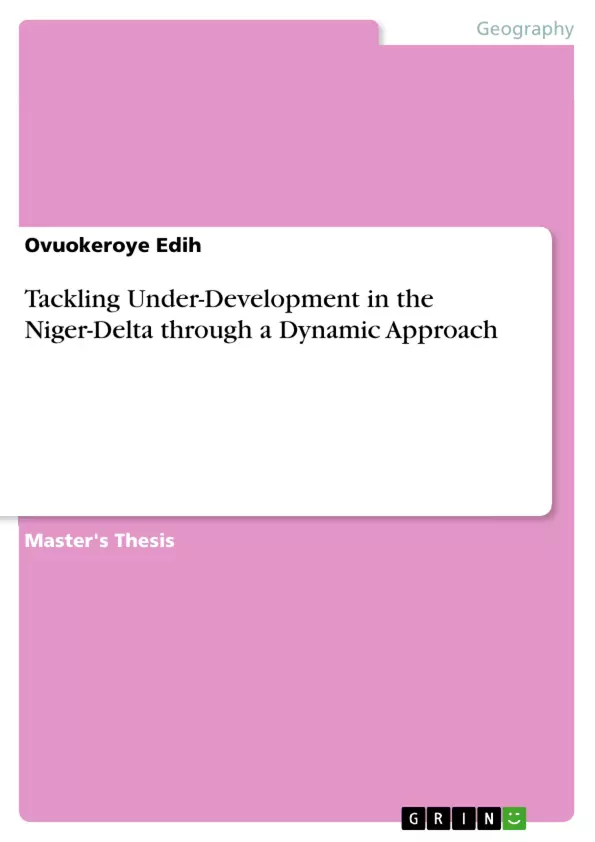The study analyzed a mathematical model that would help to facilitate the development of the Niger Delta region in a phase by phase approach. The region has been bedeviled with the problem of underdevelopment culminating into youth restiveness, violence and militancy, poverty and environmental degradation despite the abundant oil wealth. The study utilized secondary data. A network model was drawn to practically and mathematically demonstrate the journey from under-development towards development and analyzed by applying the forward recursive equation formulated for study.
The problem of under-development in the Niger-Delta is no longer a mean issue because it has transcended from national to international dimension. It is complex and hydra-headedsince it has resulted to youth restiveness and taking of arms against the government. Jobless youths are tired of failed promises to provide job opportunities and enabling environment for private businesses. More so, the activities of oil exploration and exploitation have depleted the ecosystem. Environmental degradation through theactions of oil spills aredestroyingfarm lands and rivers.In such a precarious situation in the Niger- Delta, Mere political pronouncements or jamborees cannot and will not solve this sickness from its roots. This is why a multi- dimensional approach must be applied and the government must develop the Niger-Delta area. It is against this backdrop that, the researcher is working on the possibility of developing adynamic plan for solving the problem of under-development plaguing the Niger-Delta region.
Inhaltsverzeichnis (Table of Contents)
- ABSTRACT
- CHAPTER ONE
- INTRODUCTION
- 1.1 Background to the Study
- 1.2 Statement of the Problem
- 1.3 Objectives of the Study
- 1.4 Research Question
- 1.5 Research Hypothesis
- 1.6 Scope of the Study
- 1.7 Significance of the Study
- 1.8 Limitations to the Study
- 1.9 Definition of Terms
- CHAPTER TWO
- REVIEW OF RELATED LITERATURE
- 2.1 Conceptual Review
- 2.2 Empirical Studies
- 2.3 Theoretical Framework
- CHAPTER THREE
- RESEARCH METHOD
- 3.1 Research Design
- 3.2 Population of the Study
- 3.3 Sampling Procedure
- 3.4 Method of Data Collection
- 3.5 Model Specification
- 3.6 Recursive Analysis by a Network Model
- CHAPTER FOUR
- ANALYSIS OF DATA AND DISCUSSIONS
- 4.1 Model Analysis
- CHAPTER FIVE
- SUMMARY, CONCLUSION AND RECOMMENDATIONS
- 5.1 Summary
- 5.2 Conclusion
- 5.3 Recommendations
- 5.4 Contributions to Knowledge
- 5.5 Suggestions for further research
- REFERENCES
- APPENDIX A
Zielsetzung und Themenschwerpunkte (Objectives and Key Themes)
This dissertation aims to analyze a mathematical model that could facilitate the development of the Niger Delta region through a phased approach. The study focuses on understanding the causes of underdevelopment in the region, despite its abundant oil wealth, and explores potential solutions. The key themes explored include:- Underdevelopment in the Niger Delta region
- The impact of oil wealth on regional development
- The role of government and multinational companies in regional development
- The application of a mathematical model to analyze development strategies
- The importance of a dynamic approach to development planning
Zusammenfassung der Kapitel (Chapter Summaries)
- Chapter One: Introduction This chapter introduces the study by providing background information on the Niger Delta region and its history of underdevelopment. It outlines the problem statement, objectives, research questions, hypotheses, scope, significance, limitations, and definitions of key terms.
- Chapter Two: Review of Related Literature This chapter presents a comprehensive review of existing literature on the topic of underdevelopment in the Niger Delta region. It explores relevant theoretical frameworks and empirical studies.
- Chapter Three: Research Method This chapter details the research methodology employed in the study, including the research design, population, sampling procedure, data collection methods, model specification, and recursive analysis using a network model.
- Chapter Four: Analysis of Data and Discussions This chapter presents a detailed analysis of the data collected and discusses the findings in relation to the research questions and hypotheses.
Schlüsselwörter (Keywords)
The key terms and concepts that underpin this dissertation include underdevelopment, development, dynamic approach, mathematical model, Niger Delta, youth restiveness, violence, militancy, poverty, environmental degradation, oil wealth, government, multinational companies, and development plan. These terms reflect the primary focus of the research, which seeks to understand and address the complex challenges of underdevelopment in the Niger Delta region through the lens of a mathematical model and a dynamic approach to development planning.Frequently Asked Questions
What is the main cause of underdevelopment in the Niger Delta?
Despite abundant oil wealth, the region suffers from environmental degradation, poverty, and youth restiveness due to failed promises and poor government planning.
What is the "Dynamic Approach" mentioned in the study?
It is a multi-dimensional strategy that uses mathematical network models to plan regional development in a phase-by-phase approach.
How can a mathematical model help regional development?
The study uses a network model and forward recursive equations to practically demonstrate the journey from under-development to sustainable growth.
What role do oil spills play in the region's problems?
Oil spills have led to massive environmental degradation, destroying farm lands and rivers, which are the primary livelihoods for the local population.
What are the recommendations for the Nigerian government?
The government must move beyond political pronouncements and implement a structured, dynamic plan that involves environmental restoration and job creation.
- Quote paper
- Ovuokeroye Edih (Author), 2016, Tackling Under-Development in the Niger-Delta through a Dynamic Approach, Munich, GRIN Verlag, https://www.grin.com/document/1165757



